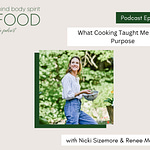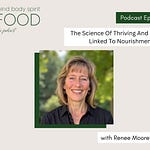Welcome to episode 4 of the podcast! Today’s show expanded me in so many ways, and I think you’re going to love it. I speak with Emily Morrison, licensed acupuncturist and Chinese medicine practitioner, and we explore food and our bodies through the lens of Chinese medicine.
Emily offers easy, applicable tips for how to nourish ourselves right now in the middle of winter, as well as during that tricky time between seasons when we head into spring. She not only discusses specific foods that can help balance us during this time (through the lens of Chinese Medicine), but she also shares lifestyle tips for how to fortify our bodies as we get ready for spring.
You're going to walk away with a whole new perspective on how to honor your body during this season, as well as on how our bodies are so connected to the world around us.
As an added bonus, below Emily has shared with us a list of foods that support us right now in accordance with Chinese medicine. Remember, this is a non-dogmatic space. These are meant to provide inspiration if they resonate with you but are not meant to be prescriptive.
Emily Morrison is the owner of Valley Spirit Acupuncture & Internal Arts in Beacon, NY and is a certified practitioner of Jin Shou TuinaTM. She also has additional medical training in Classical Gongfu Medical Theory, Cranioscaral Therapy, Thai Massage, Shiatsu, Herbalism, and Chinese Nutritional Therapy.
You can listen to the podcast right here, or, better yet, subscribe to the podcast in Apple Podcasts, Spotify, or Stitcher. Please drop me a comment if you give it a listen, and if it resonates with you, share it with your people or rate it in your podcast app—it goes a long way in supporting this work! I hope you enjoy. ❤️
Valley Spirit Acupunture: https://www.vsaia.com/
Find Emily on Instagram: @valleyspiritacupuncture
Winter Foods and Lifestyle in Accordance with Chinese Medicine
By Emily Morrison
Purpose: Nourish the Kidneys, Nourish yin, Protect and Tonify yang. Eat for the season and as locally as possible.
General focus and preparation: slow cooked meals (stews and broths) that warm the body from the inside.
Avoid:
raw and cold foods
excessively sweet or rich foods
dairy, bread, yeast and beer, all of which are traditionally thought to promote dampness which can lead to water retention, weight gain, phlegm, congestion and general stagnation (especially in winter).
Warming Foods: This may be the most essential piece of healthy eating in the winter months. However, some individuals may have “excessive heat” lodged in their body. This may be caused by a deeper internal cold or other imbalances. If there is any question, please seek out the advice of a trained practitioner to assist you in your individual needs.
mushrooms, leeks, nuts (especially walnuts, pine nuts and chestnuts), lamb, beef, anchovies, mussels and trout.
Chili, garlic, cinnamon, cardamom, curry, horseradish, peppers
Winter Foods:
Nourish the Kidneys (Kd):
Small quantities of animal-foods like lamb, beef, pork and shellfish
Whole grains like brown rice, barley and millet
Nuts and seeds, including black sesame seeds, pumpkin seeds, walnuts and chestnuts
Root vegetables such as beetroot, sweet potato, parsnip and carrots
Legumes, including kidney beans, mung beans and adzuki beans
Pungent vegetables such as ginger, onion, garlic and leeks
Warming herbs and spices like ginger, cinnamon and cloves
Black-coloured foods, like dates, wood-ear mushroom, black beans and eggplant
Broths with a pinch of salt
Goji berries, plums, figs, dates
Seaweed
Clear Damp and Fluid Retention:
kidney beans, mushrooms, sesame seeds, celery, barley and seaweed.
Fermented Foods:
Fermented foods work to support digestion and immunity by providing a source of beneficial probiotic bacteria. Plus, their distinctive sour flavor profile aids the digestion of the heavier, fattier foods we’re more inclined to eat in winter.
kimchi, miso, sauerkraut, and pickled vegetables such as carrots, beetroots and cucumbers.
Salt:
Choose foods that are naturally salty, including many of those that come from the ocean, like saltwater fish, prawns, lobster, scallops, oysters and seaweed. Miso soup is a good option too.
**It is still important to be aware of excessive salt intake, especially in individuals with a medical need to reduce salt in their diet.
Fats:
Include healthy fats. Satisfy winter cravings for fats by eating healthy fats instead of fried or packaged and processed foods.
Add whole fat organic coconut milk to soups, stews, and curries.
Organic butter, ghee, olive oil, and coconut oil are stable fats that you can include in your diet. In Chinese medicine, these are all thought to have sweet, fatty flavors with a moistening effect, which is perfect for winter months. In addition, butter and ghee supplement blood and qi, while olive oil is anti-inflammatory.
**Bitter Leafy greens and fermented foods aid in digestion of fats
Sweets:
Excessive sweets can cause damage, overload the metabolism, and in Chinese medicine terms, may harm the spleen qi and lead to dampness that can slow down metabolism causing weight gain and poor digestion.
Instead of reaching for sugary, cold ice cream for dessert, we suggest baked apples and pears with cinnamon for a warm and cozy treat. You can even add a drizzle of raw honey if you’d like some more sweetness. Grapes, raspberries, plums, figs, and red wine are also good choices for when that sugar craving hits. Of course, everything in moderation!
Vitamin C:
Vit C rich foods are excellent sources of antioxidants and fiber and are important during the winter months to support the immune system.
Oranges and other citrus, such as lemons, grapefruit, and mandarins
Kiwifruit
Strawberries
Red and green capsicum
Red and green chillies
Cabbage
Cauliflower
Broccoli
Hydration:
warm/hot water and teas, ginger root tea, broth
Avoid iced drinks and smoothies
Other Lifestyle Tips:
Allow yourself to rest
Spend as much time in the sunshine as possible
Keep your body warm and protected from the elements, particular wind and cold (scarves, hats, warm coats, etc.). Keeping your feet and low back warm help support and protect the kidneys directly.
Avoid excessive exercise, move gently and with intention.
Be in nature (this applies to every season!)
Create habits of contemplation- journaling, mediation, community groups/circles, etc
Turn off the screen when the sun sets. Attempt to organize your day in rhythm with the sun. This is very hard for us in our current day and it it is one of the















Share this post